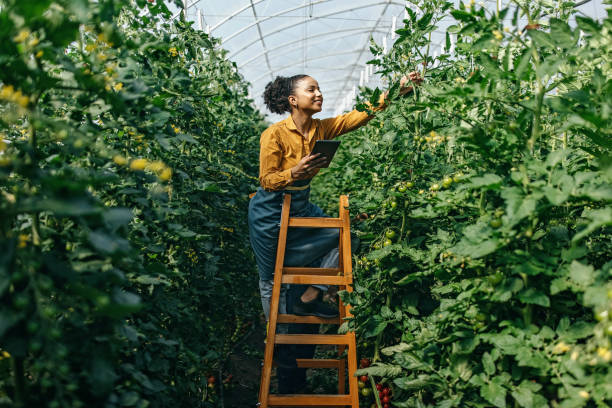Resilient Enterprises: Building Sustainable SMEs in Africa
Entrepreneurship has always been a catalyst for innovation, job creation, and economic growth. Yet today, the role of entrepreneurs, particularly small and medium-sized enterprises (SMEs), has expanded to address far more complex and urgent challenges. From climate change to food insecurity and rising unemployment, businesses are increasingly being called upon to create solutions that generate both profit and positive impact. Nowhere is this responsibility more pressing than in agribusiness, where sustainability is no longer optional but a fundamental driver of resilience and long-term growth.

Agribusiness lies at the heart of many economies across the world. In developing countries, agriculture forms the backbone of livelihoods, providing employment for millions and ensuring food security. In Africa alone, SMEs are estimated to account for up to 80% of jobs, with a large share tied to farming, food processing, and distribution. These enterprises are not just businesses; they are lifelines that connect rural communities to markets, link producers to consumers, and underpin the stability of national economies. By embedding sustainability into their operations, agribusiness SMEs have the power to transform challenges into opportunities, simultaneously protecting the environment, improving livelihoods, and building resilient communities.
Sustainability for SMEs goes beyond compliance or corporate social responsibility; it is about integrating long-term thinking into every aspect of business operations. At its core, it is about balancing people, planet, and profit. This requires a reimagining of how resources are used and how businesses interact with the communities around them. It can mean improving resource efficiency by reducing waste and maximizing water and energy use, or investing in climate-smart agricultural practices such as agroforestry, regenerative farming, and the cultivation of drought-resistant crops. Sustainability also calls for a commitment to inclusive growth, ensuring that women, youth, and marginalized groups are meaningfully empowered within the value chain. Furthermore, the adoption of circular economy models opens opportunities to turn waste into value for example, converting crop residues or fruit peels into organic fertilizer, biogas, or animal feed reducing environmental strain while diversifying income streams.
The potential for SMEs to create lasting impact in their communities is immense. They provide employment, particularly for youth and women who often face barriers to formal work. They build capacity by offering training and mentorship to farmers and suppliers, equipping them with modern and sustainable practices that strengthen entire value chains. SMEs also expand market access, acting as vital bridges that connect smallholder farmers to urban centers and global buyers. Through social innovation, they create solutions tailored to local needs, from affordable irrigation systems that ensure year-round farming to solar-powered cold storage facilities that reduce post-harvest losses. Beyond economic outcomes, many SMEs actively contribute to environmental restoration, whether through tree planting, soil regeneration, or reducing their carbon footprint, demonstrating that profitability and sustainability can go hand in hand.

Photo credit: Getty images
Across Africa, there are powerful examples of SMEs that embody this vision. In Uganda, Farm Kiosk , a youth-led agri-tech platform, connects smallholder farmers to markets through digital tools, improving incomes while reducing post-harvest losses. Similarly, EzyAgric in Uganda, though focused on using technology to improve transport and agricultural services, shows how SMEs in adjacent sectors can also embrace sustainability and community impact. In Kenya, Twiga Foods is transforming food distribution by linking farmers directly to urban retailers using mobile technology, cutting out middlemen, reducing food waste, and ensuring fairer prices. In Nigeria, ColdHubs has developed solar-powered cold storage units that allow small-scale farmers and market vendors to preserve perishable produce, extending shelf life, reducing waste, and increasing profitability. Meanwhile, in Ghana, AgroCenta is empowering smallholder farmers with access to digital platforms that provide market information, logistics, and financial inclusion tools, helping rural communities thrive in the digital economy. These examples demonstrate that SMEs, when equipped with innovation and guided by sustainable values, can deliver immense impact. They prove that sustainability is not just a moral imperative but also a pathway to competitive advantage and resilience.
Yet for SMEs to fully realise their potential as drivers of sustainability and community transformation, the broader ecosystem must play its part. Governments have a role to create enabling environments through policies, incentives, and infrastructure that support sustainable business models. Investors and financial institutions must innovate in financing, offering accessible and affordable capital that empowers SMEs to invest in sustainable technologies and practices. Development partners and academic institutions can strengthen knowledge-sharing and capacity-building efforts, equipping entrepreneurs with the skills and tools they need to scale impact. Equally important, consumers wield considerable influence in shaping the market, and by choosing to support enterprises that prioritise ethical and sustainable practices, they can accelerate the shift towards more responsible business.
The future of entrepreneurship will be defined by businesses that are both profitable and purpose-driven. In agribusiness, SMEs that embed sustainability into their DNA are not only positioning themselves to thrive in competitive markets, but also to become engines of social transformation and environmental stewardship. By building enterprises that feed populations, protect the planet, and uplift communities, these entrepreneurs are charting a path towards a more inclusive, resilient, and sustainable future.
Sheila Bahonya
Agripreneurship Alliance
14 October 2025